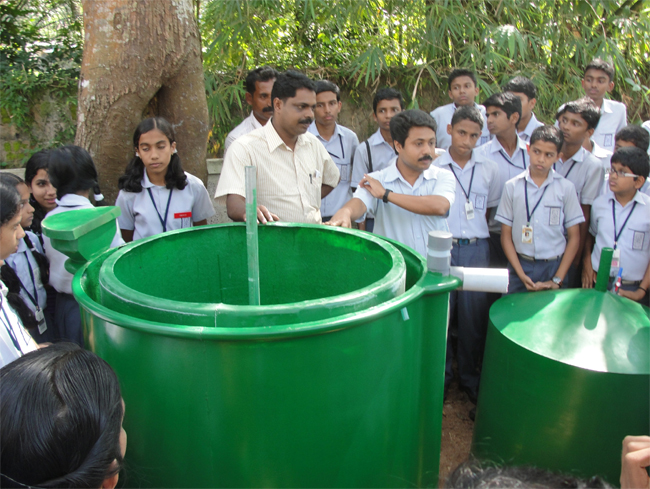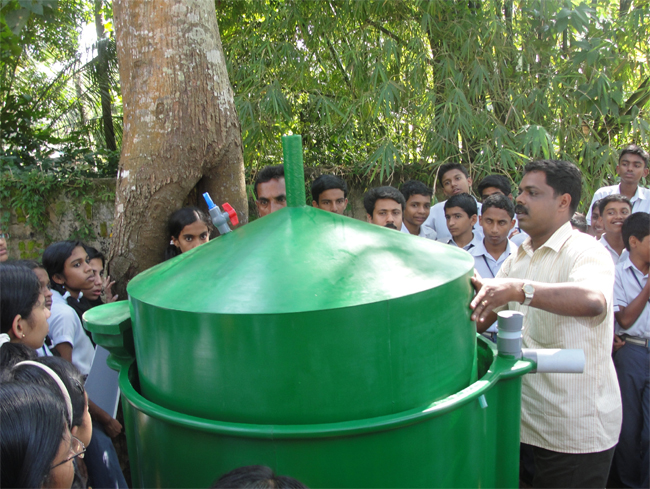Successful implementation of a biogas pilot plant in a School in Kerala by CEET, Kottayam: A model for decentralised waste management
CEET experimented a pilot plant in a school having around 1200 children from 1st standard to 12’th standard (between the age group of 5 to 17) in 2010.
The School
Chinmaya Vidyalaya, a CBSE school near Illickal, close to Kottayam town, has over 1200 students on its rolls. The school imparts quality education targeted at fostering all round development of the students. The students are encouraged to take part in a variety of programmes and activities that helps in shaping their emotional, intellectual, physical and spiritual development. The school also has a very active ECO CLUB which has been carrying out environmental awareness and support activities within the school for the past couple of years. One reason Chinmaya was chosen for the Project was the enthusiasm and dedication showed by the teachers and Head of the institution in our project. They were very supportive and more than ready to cooperate in all possible ways. Moreover, the students come from a middle class and lower middle class background with mediocre exposure to environment related activities.
This project helps the students understand
• The symbiotic relationships that make up an ecosystem and how human beings
are also part of the system.
• how waste is generated by human activities, how accumulation of waste creates
imbalances in the ecosystem and how this waste can be converted into
ecologically useful substances
• To go beyond theoretical understanding about the various processes involved in
waste management in order to make it more personal.
• And the need to take this learning to their homes and community and
practically use waste management methods in their daily lives
Waste Disposal before the Project
The major waste produced in the school was food waste and some plastic covers and wrappers. The food waste was sorted from the plastic and dumped into pits where it used to rot. In rainy season, due to accumulation of stagnant water it was a breeding ground for mosquitoes. The rotting of food created foul smell in the surrounding. The plastics waste was generally burned along with paper and dry leaves.
The Participants
The members comprising of students from VI – IX (between the age group of 11-13) classes and the teacher in-charge of these clubs.
Different Phases of the Project
The project was conducted in three phases.
1) Planning 2) Implementation 3) Operation
In the “Planning Phase” the students were given theoretical understanding of how waste is generated by human activities, how waste produced creates imbalances in the ecosystem and how this waste can be used as a raw material for useful substances like fuel and fertilizer. Dr. Usha, Hon.Director, CEET, and Anita Sajit, Programme Coordinator, handled these sessions. Thereafter, the students were divided into groups and asked to assess how waste was being disposed off in the school at present. For which they were asked to interview the Principal, the Administrative Officer and also staff involved in cleaning activities to know what they felt about it and how can it be improved. (student report and findings attached)
The next phase, Implementation involved getting the Biogas plant installed. The
students were asked to watch the entire process of installation and working of the plant.
The final phase of Operations involved installation of aluminum buckets in each floor
for sorting organic and inorganic wastes such as plastics and toffee wrappers. Training was given to the cleaning staff on the need of waste management and the harmful effects it caused globally. They were also trained in handling the unit properly. A 45 min interactive session was conducted by a Retd. Professor, Department of Chemistry on the process involved in the production of methane gas and why certain things like egg shells, orange peels etc should not be deposited in the plant for it to function effectively.

Installation of the biogas plant in the school premises on 20th December 2010 by CEET

Installation of the biogas plant in the school premises and its demonstration on 20th December 2010 by CEET
The Session Plan (Implementation Details)
SESSIONS |
Date |
TOPIC |
Session 1 |
10th November 2010 |
Introduction to the Project. Group division and assigning tasks. How to do it – the procedure by CEET personnel |
Session 2 |
19th November 2010 |
Compiling a report of the findings by the students as far as waste management in school is concerned. |
Session 3 |
10th December 2010 |
What is waste Management, How waste can be converted into manure, biogas etc in an easy way. How it is important for the Society – Dr. Usha, Hon. Research Coordinator, CEET, Kottayam |
Session 4 |
15th December 2010 |
Students go to the neighbouring houses to give a briefing on waste management. |
Session 5 |
20th December 2010 |
Installing a the biogas plant in the school
premises |
Session 6 |
3rd January 2011 |
The plant begins gas production. Inauguration by lighting the stove by the school principal |
Session 7 |
10th January 2011 |
An Awareness session for the cleaning staff on maintenance of the plant and waste Management in general |
Session 8 |
27th January 2011 |
A session on the function, production and maintenance of the biogas plant |
Present Scenario and added benefit
The school has a fully functional Bio Gas plant thanks to CEET. The fuel produced is
sufficient for the needs of the school. Two colour coded plastic buckets have been kept in each floor and the students asked to dump organic and inorganic wastes separately. This is monitored by the CEET and ECO CLUB. The School has made arrangements with the municipality to collect and dispose the plastic waste generated.
The school also is constructing a burning chamber where dry leaves and paper could be burned without the fumes polluting the environment. The slurry produced is being used as fertilizer for the vegetable garden and potted plants that the school had been maintaining. The students are highly motivated and are taking the message to their homes. A biogas plant was installed recently in the house of Ms. Kartiyayani, a IX standard student of Chinmaya. A few are to follow suit.
Additional benefit is that the CBSE curriculum followed by the school has chapters on various aspects of waste, waste management, pollution caused by poor management, BioGas plants, its use etc. The presence of a biogas plant would definitely go way beyond creating theoretical understanding about the various processes involved in waste management and make it a more personal experience to the students year after year.
With the Success of this project, CEET now plans to implement this project in another 100 selected schools in Kerala


